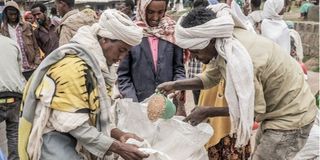Prime
Drought making East Africa cry

Food security in East Africa is in jeopardy due to the drought. PHOTO | COURTESY
What you need to know:
- Millions of people are at risk of death unless they are supported with food aid
Tanzania has for years enjoyed relative food security with only pockets of hunger here and there. As Tanzanians, we should be very grateful to God for His blessings.
Our dear brothers and sisters in the rest of the East African states, life has never been the same.
According to Michael Dunford of the United Nations (UN), Eastern Africa, including the Horn of Africa, is facing the worst drought in over 60 years, leaving 22 million people affected by droughts.
No wonder a cross-section of Ethiopia, Northern Kenya, and Somalia requires humanitarian relief to survive. Thousands of animals like cows have lost their lives due to a lack of food and water.
Millions of people are at risk of death unless they are supported with food aid. One of the worst things that can happen to a human being is to die of starvation; what a cruel and painful death!
As we celebrate the 2023 International Women’s Day, let us think more about water shortage or lack of water in our communities.
This challenge is due to drought (unreliable rainfall), which is associated with climate change. Water shortage/lack of water has become a way of life despite the fact that clean and safe water is one of the basic human rights.
Yet, in many parts of Eastern Africa, some rivers and streams have dried up, and no even access to piped water.
One of the unfortunate facts of life is that water shortage/scarcity in Africa is acute for women. In most African culture, women are the ones fetching water for household uses, and often traveling long distances, mostly on foot.
According to the UN, women in Sub-Saharan Africa spend an average of 16 million hours daily fetching water, which takes up a significant amount of their time but can also be physically demanding and dangerous.
The physical health of women may suffer due to the physical demands of walking long distances fetching water, causing foot, back and neck pains.
Those who spend much time/long distances to collect water may also be vulnerable to physical and sexual assault.
Access to education by both girls and women is negatively affected by the lack of access to water. Yes, time spent fetching water keeps them out of school and working stations, respectively.
That situation may reduce their opportunities for educational and economic advancement, furthering the poverty cycle.
Families are more prone to experience water-related illnesses like diarrhea and cholera. That situation occurs when women fail to supply their families with adequate clean and safe water. These illnesses are dangerous to children and can cause malnutrition and even death.
The contributions of women in our families, society, nation and the world at large are well known; they are the prime caretakers of all the families around the world.
No wonder, the UN have set aside a special day (for honouring them) called International Women’s Day, which is celebrated every year on 8th March.
The theme of this year is “Choose to Challenge,” encouraging everyone to challenge gender bias and inequality in their lives and society as a whole.
As we celebrate International Women’s Day and their contributions to our society, we should take action to support their rights. My thoughts to women are on the significant impact of water problems (especially in rural areas) on women.
The world must work towards finding solutions to improve access to clean water and promote gender equality.
Sadly water problems have significant implications on the lives of women and girls in their health, education, and economic opportunities.
So, as the drought continues in the region, more problems emerge for women. In some African tribes, when things become worse, some men run away from their homes, leaving women and children to suffer the consequences.



